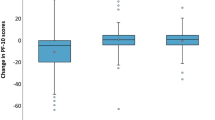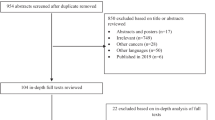Abstract
This longitudinal study analyzed the interactions between the quality of life and the coping strategies of 100 patients treated for breast cancer and their caregivers. Data were collected after diagnosis, at the end of treatment, and 6 months after treatment with the Quality of Life Questionnaire-C30 (QLQ-C30), Duke Health Profile and Ways of Coping Checklist for both patients and caregivers. The theoretical model was tested using a typology of patients and mixed model analyses. The quality of life of patients changed over time and no cluster effect was found. The influence of the sociodemographic characteristics, coping strategies (patients and caregivers) and the quality of life of caregivers on patient’s quality of life were different according to the quality of life dimensions considered. To understand the adaptation of patients to their disease, it is therefore essential to look at whether the caregiver is capable of playing a supporting role.



Similar content being viewed by others
References
Baider, L., Perry, S., Holland, J. C., Sison, A., & Kapln DeNour, A. (1995). Couples and gender relationship: A sample of melanoma patients and their spouses. Family Systems Medicine, 13, 69–77.
Ben-Zur, H., Gilbar, O., & Lev, S. (2001). Coping with breast cancer: Patients, spouse, and dyad models. Psychosomatic Medicine, 63, 32–39.
Bloom, J. R., Stewart, S. L., Chang, S., & Banks, P. J. (2004). Then and now: Quality of life of young breast cancer survivors. Psycho-Oncology, 13, 147–160.
Bodenmann, G. (1995). A systemic-transactional conceptualization of stress and coping in couples. Swiss Journal of Psychology, 54, 34–44.
Bodenmann, G., Pihet, S., & Kayser, K. (2006). The relationship between dyadic coping and marital quality: A 2-year longitudinal study. Journal of Family Psychology, 20, 485–493.
Conroy, T., Mercier, M., Bonneterre, J., Luporsi, E., Lefebvre, J. L., Lapeyre, M., et al. (2004). French version of FACT-G: Validation and comparison with other cancer-specific instruments. European Journal of Cancer, 40, 2243–2252.
Couper, J. W., Bloch, S., Love, A., Duchesne, G., Macvean, M., & Kissane, D. W. (2006). Psychological impact of prostate cancer in patients and their partners. Medical Journal of Australia, 185, 428–432.
Cousson, F., Bruchon-Schweitzer, M. L., Quintard, B., Nuissier, J., & Rascle, N. (1996). Analyse multidimensionnelle d’une échelle de coping: validation française de la W.C.C. (ways of coping checklist). Psychologie française, 41, 155–164.
Diggle, P. J., Liang, K. Y., & Zeger, S. L. (1994). Analysis of longitudinal data. Oxford: Clarendon Press.
Dupuy O. (2006). Vers une reconnaissance statutaire? In: H. Joublin (coord.), Proximologie. Regards croisés sur l’entourage des personnes malades, dépendantes ou handicapées. Paris: Flammarion, Coll. “Médecine-Sciences”.
Ganz, P. A., Rowland, J. H., Desmond, K. A., Meyerowitz, B. E., & Wyatt, G. E. (1988). Life after breast cancer: Understanding women’s health-related quality of life and sexual functioning. Journal of Clinical Oncology, 16, 501–514.
Gaston-Johansson, F., Lachica, E. M., Fall-Dickson, J. M., & Kennedy, M. J. (2004). Psychological distress, fatigue, burden of care, and quality of life in primary caregivers of patients with breast cancer undergoing autologous bone marrow transplantation. Oncology Nursing Forum, 31, 1161–1169.
Given, B., & Given, C. W. (1992). Patient and family caregivers’ reaction to new and recurrent breast cancer. Journal of the American Medical Women’s Association, 47, 201–206.
Groenvold, M., Klee, M. C., Sprangers, M. A. G., & Aaronson, N. K. (1997). Validation of the EORTC QLQC30 Quality of Life Questionnaire through combined qualitative and quantitative assessment of patient-observer agreement. Journal of Clinical Epidemiology, 50, 441–450.
Grunfeld, E., Coyle, D., Whelan, T., Clinch, J., Reyno, L., Earle, C., et al. (2004). Family caregiver burden: Results of a longitudinal study of breast cancer patients and their principal caregivers. Canadian Medical Association Journal, 170, 1795–1801.
Guillemin, F., Paul-Dauphin, A., Virion, J. M., Bouchet, C., & Briançon, S. (1997). The Duke Health Profile: A generic instrument to measure the quality of life tied to health. Santé Publique, 9, 35–44.
Hannum, J. W., Giese-Davis, J., Harding, K., & Hatfield, A. K. (1991). Effects of individual and marital variables on coping with cancer. Journal of Psychosocial Cancer, 9(2), 1–20.
Holzner, B., Kemmler, G., & Kopp, M. (2001). Quality of life in breast cancer patients-not enough attention for long-term survivors? Psychosomatics, 42, 117–123.
Julkunen, J., Gustavsson-Lilius, M., & Hietane, P. (2009). Anger expression, partner support, and quality of life in cancer patients. Journal of Psychosomatic Research, 66, 235–244.
Kershaw, T., Northouse, L., Kritpracha, C., Schafenacker, A., & Mood, D. (2004). Coping strategies and quality of life in women with advanced breast cancer and their family caregivers. Psychology and Health, 19, 139–155.
Klauer, T., & Winkeler, M. (2006). Gender, mental health status, and social support during a stressful event. In G. Weidner, M. Kopp, & M. Kristenson (Eds.), Heart disease: Environment, stress, and gender, NATO Science Series, Series I: Life and Behavioral Sciences (Vol. 327, pp. 223–236). Amsterdam: IOS Press.
Les proches de patients atteints de cancer. Usure et temporalité. Abord de la problématique et expériences croisées des professionnels et des intéressés, février (2006). INCa Institut Nationale du Cancer: HYPERLINK “http://www.e-cancer.fr“, 2006.
Lindholm, L., Rehnsfeldt, A., & Arman, M. (2002). Significant others’ experience of suffering when living with women with breast cancer. Scandinavian Journal of Caring Sciences, 16, 248–255.
Mandelblatt, J., Figueiredo, M., & Cullen, J. (2003). Outcomes and quality of life following breast cancer treatment in older women: When, why, how much, and what do women want? Health and Quality of Life Outcomes, 1, 1–11.
Ministére de la sante et de la protection sociale & Ministère de l’emploi, du travail, et de la cohésion sociale, Direction de la recherche, des études, de l’évaluation et des statistiques, (DREES). (2006). Les conditions de vie des patients atteints du cancer deux ans après le diagnostic: Etudes et Résultats, 486.
Mols, F., Vingerhoets, A. J., Coebergh, J. W., & Van de Poll-Franse, L. V. (2005). Quality of life among long-term breast cancer survivors: A systematic review. European Journal of Cancer, 41, 2613–2619.
Northouse, L. L., & Swain, M. A. (1987). Adjustment of patients and husbands to the initial impact of breast cancer. Nursing Research, 36, 221–225.
Pakerson, G. R., Broadhead, W. E., & Tse, C. K. (1990). The duke health profile. A 17-item measure of health and dysfunction. Medical Care, 28, 1056–1072.
Parker, P. A., Baile, W. F., De Moor, C., & Cohen, L. (2003). Psychosocial and demographic predictors of quality of life in a large sample of cancer patients. Psycho-Oncology, 12, 183–193.
Petrie, W., Logan, J., & DeGrasse, C. (2001). Research review of the supportive care needs of spouses of women with breast cancer. Oncology Nursing Forum, 28, 1601–1607.
Ptacek, J. T., Ptacek, J. J., & Dodge, K. L. (1994). Coping with breast cancer from the perspectives of husbands and wives. Journal of Psychosocial Oncology, 12, 47–72.
Verbeke, G., & Molenberghs, G. (2000). Linear mixed models for longitudinal data. New York: Springer.
Vitaliano, P. P. (1985). The Ways of Coping Checklist: Revision and psychosometric properties. Multivariate Behavioral Research, 20, 3–26.
Wagner, C. D., Bigatti, S. M., & Storniolo, A. M. (2006). Quality of life of husbands of women with breast cancer. Psycho-Oncology, 15, 109–120.
Acknowledgments
The authors would like to extend their sincere thanks to the women and their caregivers who took part in this study. They would also like to thank the Ligue Nationale contre le Cancer (French Cancer League) for its financial support, Doctor Dravet at the Cancer Treatment and Research Center of Saint Herblain for his time and help and Mme Anne Hartmann who participated in collecting the data.
Ethical standards
The study protocol was approved by the scientific committee of the Ligue Nationale Contre le Cancer (the French Cancer League) and by the management committee of the Cancer Treatment and Research Center René Gauducheau of Saint Herbalin (Nantes in France).
Author information
Authors and Affiliations
Corresponding author
Rights and permissions
About this article
Cite this article
Bonnaud-Antignac, A., Hardouin, JB., Leger, J. et al. Quality of Life and Coping of Women Treated for Breast Cancer and Their Caregiver. What are the Interactions?. J Clin Psychol Med Settings 19, 320–328 (2012). https://doi.org/10.1007/s10880-012-9300-9
Published:
Issue Date:
DOI: https://doi.org/10.1007/s10880-012-9300-9




